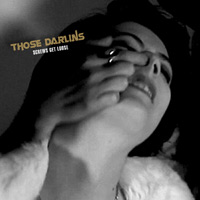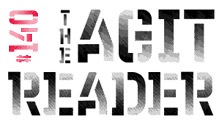
Here Before
Bar/None
Over their 35-year existence, the Feelies have had a way of disappearing. After their blithe melding of nervous energy and VU riffs on Crazy Rhythms in 1980, guitarists Glenn Mercer and Bill Million took a four-year break before re-emerging with a new three-person rhythm section. And four years was a big deal back when bands put out a record nearly every year. When they reconvened in 2008 to play some shows, the respite between performances had been 17 years.
Fortunately, with the appearance of their first album since 1991’s Time for a Witness, it now appears that the Feelies have been rejuvenated in earnest. But rather than starting where the band left off, Here Before hearkens back to The Good Earth and Only Life, the two albums from the ’80s quintessential to the band’s second incarnation. With a title that fits in perfectly amongst songs like “For Awhile” and “Too Far Gone,” “Nobody Knows,” which contemplates the band’s reunion in lines like, “Is it too late to do it again?” is a mesh of the propulsive strumming and rhythms that characterized that latter record. “Again Today,” which is marked by Mercer’s talent for being at once incredibly vague and seemingly deep, is even better with more of the jangle and slight solos that the Feelies were always so adept at creating. The rest of the album is equally invigorated, with songs like “When You Know” and “Bluer Skies” being amongst the band’s best. Mercer eventually answers his own questioning about the band’s existence on “Time Is Right,” and he is absolutely correct in thinking that there’s no time like the present for the Feelies’ rekindling.
Stephen Slaybaugh

Regifted Light
Drag City
Baby Dee’s life, like the music she makes, would make great fodder for a JM Barrie novel—replete with fanciful garden adventures, carnivals and circus freaks—all basked in golden-hued early 20th century wonder. She was born a he in Cleveland, where she learned from an early age that creativity was the way to satiate curiosity. In the 1970s, she passed her days as street performer and then made the logical transition to organist in a Catholic church. These sundry life experiences no doubt lend themselves to Dee’s abundant performance material. In a way, though, her entire music career is a performance act in itself, as she embarks upon a transformation with each release.
For this particular act in the epic story that is Baby Dee’s life—entitled Regifted Light—we find Dee in the real-life role of piano connoisseur, pounding the keys on an old Steinway D, a gift from Andrew WK. Beginning with the charmingly whimsical “Cowboys with Cowboy Hat Hair” on through the glorious melancholy of the title track, the album is the perfect outlet for her extraordinary aptitude for and appreciation of the somewhat antiquated instrument. Woeful cello and string arrangements are woven throughout courtesy of Jon Steinmeier and Matthew Robinson.
Though the press release describes Light as a “largely wordless album,” and true, the Steinway D is the real star in this sky, Dee’s sparse yet poetic lyrics and haunting falsetto are not to be disregarded. Her deeply emotive voice draws obvious comparison to the brilliant, moving vibrato of Antony Hegarty. Perhaps that’s because, as she clarifies to the London Evening Standard, “The way I sing it is just the way it comes out,” which makes for a truly intimate experience traversing the sinuous melodies of her unconscious. Unlike previous albums, which have been called flamboyant, Light is raw and, at times, subdued. That said, in true Baby Dee hat-in-the-wind fashion, the album’s not without a red herring: the overtly over-the-top operatic ode to pie, aptly titled “The Pie Song.” It’s probably pointless to postulate what role Baby Dee will embrace next, but at least she’s left a small gift for us to do the embracing in the meantime.
Jennifer Farmer

Screws Get Loose
Oh Wow Dang
In this super accelerated world of hype, it’s possible for a band to be old-hat even before its first record drops. So the plausibility of a second record is like asking the Dave Clark 5 to get back together for another go. Who can remember that far back? Such is the case of Nashville-based Those Darlins. After charming fans with their rowdy live show and country-infused punky girl-group harmonies, they dropped their self-titled debut in 2009. And after the blogosphere equivalent of a lost weekend, they’ve returned with Screws Get Loose. But do they still have the chops? After all, 2009 was so long ago.
Anyone enamored with the soundclash of styles on the first album may be surprised by the curveball presented by the sisters Darlin and drummer Linwood Regensburg. The country influences are much more subdued this go ’round. While there are still rustic accents that pop up every now and again, the country influence isn’t immediately obvious. What is in heavy supply are vocal harmonies shot via a garage-rock filter. Adding to the seachange is the emergence of Regensburg as lead vocalist on “Let U Down.” Another group might have relegated the song to a B-side, but clearly the band wasn’t content to stay with the status quo.
What hasn’t changed for Those Darlins is that their gleefully bratty sense of humor is still intact. From deflecting a pal’s romantic overtures on “Be a Bro” with phrases like “I just wanna beat each other up on the playground to see who gets the bloody nose” to the self-explanatory “Fatty Needs a Fix,” the band treads the fine line between humorous observers and joke band. Thankfully even some of the potentially sillier moments come across as playful deflections than like Bowling For Soup. And relative to the first album, Screws Get Loose is a more mature take on things. It’s nice to see the grizzled vets of Those Darlins still have it in them to deliver the goods.
Dorian S. Ham

The Golden Age of Knowhere
RCA
At one point in popular television series True Blood, one of the main characters remarks that, in the past, puns were the highest and most clever form of humor. The character is an ageless vampire who, while being aware of the absurdity of certain fads, modes or genres that are outdated and stale, can still reconcile the value of some of those things and incorporate them into the world he finds himself in. Lets say this vampire character lived through the early 2000s, when New York was all neon and skinny ties and dance rock. Could we fault him for thinking that perhaps less than 10 years having past, the same vibe would be relevant? Given that he can still look past the slow humor of a pun, can he still look past the tired sound of dance punk?
At first glance, the puns in Funeral Party’s song and album titles stick out; the album is named The Golden Age of Knowhere and the third song (out of 11) is called “Finale.” Usually puns are pretty easy to figure out, but sometimes they are lazy and meaningless. When it comes to song titles, perhaps the music should speak for itself. Bands like Franz Ferdinand or LCD Soundsystem have perfected the dance-rock genre to the point where new material sort of sounds like flogging a dead horse (if you will). Is there room for more? You better believe it. Funeral Party has been around a few years and have had enough excitement around them to attract major label attention and produce some interesting t-shirts and a few singles. The Golden Age of Knowhere is Funeral Party’s first proper long player, and it’s another entry into the disco-rhythmic, guitar-driven dance rock section of your local record store. It’s perfectly competent music. The rhythm section is energetic and almost exciting at times. The vocal melodies, while lacking in lyrical content, have almost enough hook to them to make them memorable, but it’s almost as if Funeral Party just couldn’t make that one last push into the realm of the new. If you’re satisfied with the dance rock genre and just want more, find a copy of The Golden Age of Knowhere somewhere. If not, some fads are best left in the dust they turned into so we can grow something new.
Michael P. O’Shaughnessy

Moody, Standard and Poor
Sub Pop
Listening to Obits’ sophomore album, Moody, Standard and Poor, one gets the impression that rock & roll comes as naturally to the band as breathing. Even more so than on the band’s debut, I Blame You, on Moody each song seems comprised of only the necessary parts, leans guitar riffs jousting with quick bass thuds and brisk drum smacks. This no-frills approach makes it apparent that Obits’ have more balls than most in Brooklyn and that few of the girly jeans–wearing sect inhabiting said borough can hold a candle to what they do.
Of course, this shouldn’t be surprising given lead Obit Rick Froberg’s pedigree (Drive Like Jehu, Hot Snakes), but Moody is the kind of benchmark record that separates a band from the pack. The Obits rush out of the gates with “You Gotta Lose,” but it’s the album’s second track that shows their mettle. “I Want Results” mixes moody (no pun intended) verses with lacerating choruses into an effective model of tension and release. “New August” is a similarly nuanced cut, beginning with a long intro before gradually building to a cathartic peak, not comprised of a melee of guitar sparks and drumming fury, but a precise stop. The whole album is constructed in much the same way. While the band eschews fancy bells and whistles, their basic approach still produces results that are hardly elementary.
Stephen Slaybaugh
MP3: “Shift Operator”
ALBUM REVIEWS
Generationals, Actor-Caster
Davila 666, Tan Bajo
Keren Ann, 101
Darlings, Warma EP
J Mascis, Several Shades of Why
New York Dolls, Dancing Backward in High Heels
Rise Against, Endgame
Hype Williams, One Nation
Exene Cervenka, The Excitement of Maybe
REM, Collapse Into Now
Kurt Vile, Smoke Ring for My Halo
Wye Oak, Civilian
Ancient Astronauts, Into Bass and Time
The Electronic Anthology Project, The Electronic Anthology Project
